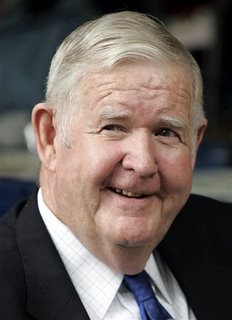Northrop Grumman Plans to Exterminate a Colony of Feral Cats That Has Lived at Its Redondo Beach Facility for Twenty Years

Capitalists are such barbarians. They not only enslave, exploit, and murder their fellow human beings but they treat the animals and Mother Nature even worse. A good case in point is giant defense contractor Northrop Grumman which announced last week that it plans to exterminate a colony of feral cats that has called its Space Technology unit in Redondo Beach (See photo above) home for the past twenty years.
To be totally accurate, Northrop did not say exactly that in so many words but the import of what it did say left little doubt as to the company's true intentions. Like such inveterate cat-haters as the American Bird Conservancy, National Audubon Society, PETA, National Geographic, the National Wildlife Federation, Les Underhill of the University of Cape Town, and UC-Davis' Pat Conrad, Northrop speaks with a forked tongue in order to protect itself from a backlash from ailurophiles. (See Cat Defender post of Marcy 3, 2006 entitled "Cat-Hating Professor at UC-Davis and the BBC Call for the Extermination of 78 Million Feral Felines.")
While denying that any final decision has been made as to the cats' fate, Director of Facilities Keith Roberts called the felines a nuisance and said that many employees had complained about them. "We just want to make sure we're ensuring the health and welfare of all our employees," he told Torrance's Daily Breeze on July 22nd. (See "Northrop Frets Over Feral Feline Issue.")
Despite Roberts' denial, Northrop has already contacted Western Exterminator of Anaheim which has offered to trap the cats and turn them over to an unnamed animal shelter in Los Angeles County. As it is well known, almost one-hundred per cent of feral cats dumped at shelters are killed immediately upon arrival. The murderous monsters who run these pet genocide factories are too cheap to house and feed them and too lazy to either socialize or find homes for them. Plus, they love killing cats and dogs!

In addition to being nuisances, Roberts and Western Exterminator claim that the cats are unhealthy, spread disease, and create a stench. None of these claims are true. Sheila Dodson (See photo above), a veterinarian with No More Homeless Pets Kansas City, has stated that feral cats are healthy and do not have any higher incidence of disease than do their domestic counterparts. They are thus no more likely to spread disease than domesticated felines. (See Cat Defender post of May 16, 2006 entitled "Kansas City Vets Break Ranks with AVMA to Defend Cats Against Bird Advocates, Wildlife Proponents, and Exterminators.")
Complaints about the cats smelling up the grounds are almost certainly untrue as well because since 1995 a dedicated group of Northrop employees has been looking after them. Over the past five years they have spent more than $20,000 on food, trapping, desexing, vaccinations, and flea powder. It is therefore highly unlikely that they have allowed urine and feces to build up and moreover sterilization puts an end to tomcats spraying in order to mark their territory.
Over the years, the implementation of a TNR program has helped to reduce the colony from thirty to thirteen cats. The caregivers have grievously erred however in killing sick cats. Not only is what they have done immoral, but alternatives are available. For instance, 10th Life Sanctuary in Clewiston, Florida provides a home for sick cats and there are no doubt other such facilities elsewhere. (See Cat Defender post of July 13, 2006 entitled "Heroic Little Kitten, Fiendishly Run Through a Wood Chipper by Some Devil, Loses His Nineteen-Day Struggle to Live.")

Caregiver Carol Kahler, who retired from Northrop in 2003 after thirty-six years, suspects a more selfish motivation behind the company's bid to do in the cats: parking space. "Some idiot engineer comes along and said, 'I want to park my car back here but there are cats,'" she told the Daily Breeze.
In the final analysis, the reasoning behind the bigwigs' plans to get rid of the cats is really unimportant. Killing cats is not only immoral but TNR will gradually reduce the colony to zero and Northrop Grumman will then be all the poorer. The caregivers are doing a good job overall and management's intervention at this time is neither merited nor wanted.
Earlier this year, a plan to exterminate the long-term resident felines of the swanky Army Navy Country Club (See photo below) in Arlington, Virginia was torpedoed thanks in no small part to the intervention of Iraq War critic John P. Murtha. (See Cat Defender post of January 19, 2006 entitled "Public Outcry Forces Army Navy Country Club to Scrap Plans to Evict and Exterminate Long-Term Resident Felines.")
Since Northrop receives so many Defense Department contracts, cat advocates in Redondo Beach should consider asking Murtha (See photo above) to make the receipt of any future governmental largess contingent upon the manufacturer not harming its resident felines. Because of the key role that he plays in military appropriations, it is certainly within his province to do this.
With seven research and manufacturing facilities in the United States, Northrop Grumman is the third largest manufacturer in the world. It employs 120,000 workers and has annual revenues approaching $19 billion. Its Redondo Beach facility alone employs 9,300 people and last year racked up $3.4 billion in sales. A large chunk of its billions comes from the U.S. Treasury and it is therefore vulnerable to political pressure.

As the manufacturer of the B-2 Stealth Bomber, the Global Hawk Unarmed Aerial Vehicle, warships, lasers, missile systems, etc., Northrop is fully ensconced in the killing business. It is therefore not surprising that it does not have any respect for feline life. By letting the world know just what it is up to and through the application of political pressure it may be just possible to save the cats.
Photos: Northrop Grumman (Redondo Beach facility), Kansas City Star (Sheila Dodson), Cheryl Senter of the Associated Press (John P. Murtha), and James A. Parcell of the Washington Post (Army Navy Country Club cats).

<< Home